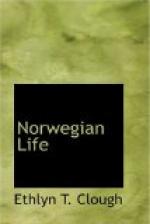On several occasions there was friction between the king and the Norwegian Storthing. At the treaty of Kiel the king had promised that Norway would assume a part of the Norwegian-Danish public debt; but as the Norwegians had never acknowledged this treaty, they held that it was not their duty to pay any part of the debt, and declared besides that Norway was not able to do so. But as the powers had agreed to help Denmark to enforce her claims, a compromise was effected in 1821, by which the Storthing agreed to pay three million dollars, the king relinquishing his civil list for a certain number of years. The same Storthing adopted the law abolishing the nobility in Norway. This step also was strongly opposed by Charles John, but as it had been adopted by three successive Storthings, the act under the constitution became a law in spite of any veto.
For a number of years there existed a want of confidence between the king and the Norwegian people. The king did not like the democratic spirit of the Norwegians, and the reactionary tendencies of his European allies had quite an influence upon his actions. In 1821 he proposed ten amendments to the constitution, looking to an increase of the royal power, among which was one giving the king an absolute instead of a suspensive veto; another giving him the right to appoint the presidents of the Storthing, and a third authorizing him to dissolve the Storthing at any time. But these amendments met the most ardent opposition in the Storthing, and were unanimously rejected.
When the Norwegians commenced to celebrate the anniversary of the adoption of the constitution (May 17), the king thought he saw in this a sign of a disloyal spirit, because they did not rather celebrate the day of their union with Sweden, and he forbade the public celebration of the day. The result of this was that “Independence Day” was celebrated with so much greater eagerness. The students at the university especially took an active part under the leadership of that champion of liberty, the poet Henrik Wergeland, who died in 1845. The unwise prohibition was the cause of the “market-place battle” in Christiania, May 17, 1829, when the troops were called out, and General Wedel dispersed the crowds that had assembled in the market-place. There was also dissatisfaction in Norway because a Swedish viceroy (Statholder) was placed at the head of the government, and because their ships had to sail under the Swedish flag.




